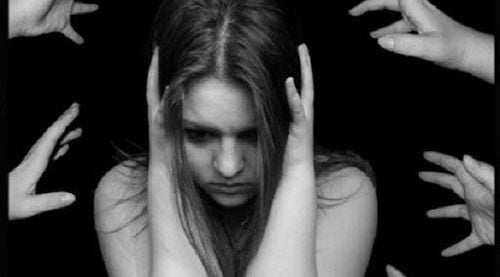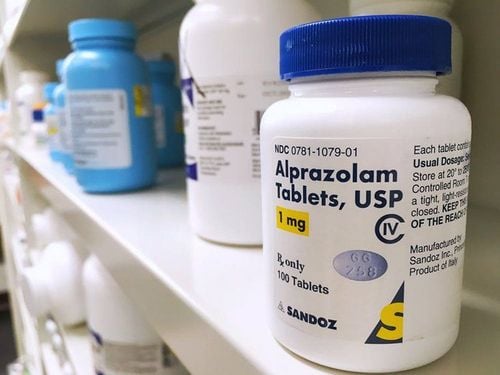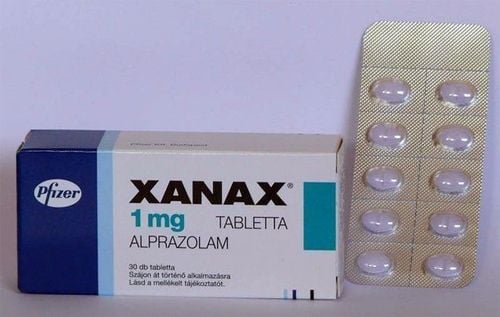This is an automatically translated article.
Good sleep is fundamental to good health, as it affects hormone levels, mood and weight. However, problems such as sleep apnea, anxiety, long-term insomnia, ... are now very common.
1. What is insomnia due to anxiety?
When worrying about something will keep you from sleeping. Some people also have a separate phobia called agoraphobia. Because they think something bad will happen to them during sleep, they need to be alert and watchful.
Insomnia and anxiety often go hand in hand. If you have an anxiety disorder, you may find it difficult to fall asleep or stay asleep. Similarly, if you have a sleep disorder, you may feel anxious or fearful before going to bed.
When you lose sleep because of anxiety, you may experience behavioral changes such as:
Feeling overwhelmed. Inability to concentrate. Irritability. Foolproof. Restlessness. A sense of imminent danger or doom. The physical effects of bedtime anxiety can include:
Digestive problems. Fast, unstable heart rate. Breathe fast, breathe fast. Sweating phenomenon. Muscle tension. Tremble. Some people also have nocturnal panic attacks. Panic attacks are sudden and intense, occurring only at night, often waking you from sleep.
2. Who is at risk for insomnia?
Anxiety and insomnia can affect everyone from adults, adolescents to children. You will be more likely to experience anxiety at night if you have a sleep disorder, such as:
Difficulty sleeping, insomnia. Narcolepsy. Restless leg syndrome (RLS). Sleep walking . People with the following mental health disorders may also develop nocturnal anxiety disorders:
Anxiety disorders. Bipolar disorder . Attenuate. Addiction to drugs or alcohol. Panic disorder. Stress and anxiety after trauma. Mental schizophrenia. A study published in the journal Sleep involved nearly 20,000 men and women who followed for five years. The researchers measured the participants' anxiety levels and tendencies at the start of the study, and stressful events, such as death, divorce, and violence, were tracked throughout the study. assist.
The results of the study have shown that people who are prone to becoming anxious and experiencing stressful life events are sleep deprived.
At the start of the study, results differed between people with a lot of anxiety and stress and those without these problems. Those who subsequently experienced a stressful event were three times more likely to have trouble sleeping within six months of the event than those who were not anxious at the start of the study.

Mất ngủ lo âu có thể do một số bệnh lý như tâm thần phân liệt gây ra
3. What causes insomnia anxiety?
Feeling anxious is a natural part of being human. We often feel fear or anxiety in dangerous situations. Stress and anxiety will trigger our body to secrete hormones that help us to react quickly to get rid of some harm. But if you have chronic anxiety, it happens all the time. You may feel intimidated by simple everyday situations like driving to work or even falling asleep.
In addition, when experiencing chronic anxiety, before bed, it can make it difficult for your body to relax. You have difficulty falling asleep and if you do fall asleep, you will wake up with stressful or anxious thoughts, staying up all night.
The combination of anxiety and insomnia can also be caused by not having enough thyroid hormone in your blood and your metabolism slowing down leading to hypothyroidism.
A study has shown that anxiety can affect rapid eye movement (REM) sleep. This is a stage of sleep when you tend to have vivid dreams. When you are anxious, dreams can be disturbed or turned into nightmares that wake you up.
4. How to treat sleep anxiety?
Anxiety or prolonged lack of sleep can affect your body in many ways. Some of the long-term complications you may experience without treatment for anxiety and insomnia are:
Diabetes . Cardiovascular problems (Heart attack, heart failure, arrhythmia...) High blood pressure. Obesity. Stroke. There are many ways to treat insomnia, including:
Changing healthy sleep habits. Use drugs. Cognitive behavioral therapy (CBT). CBT is a form of psychotherapy or talk therapy. It teaches you how to change your behavior with your thoughts. This is a common treatment for people with anxiety. A special form of CBT called cognitive behavioral therapy for insomnia (CBTI) focuses on helping people with insomnia. This therapy can take 6 to 12 weeks to see results.
During CBT or CBTI, you can learn to:
Avoid behaviors or environmental factors that make you anxious or have trouble sleeping. Gain a better understanding of how sleep and anxiety affect your brain and the rest of your body. Change negative or incorrect thoughts about bedtime. A therapist can teach you how to sleep when you're anxious using biofeedback. Biofeedback trains you to control your body's functions. You learn to relax your muscles, regulate your breathing, lower your heart rate, and focus your attention.

Mất ngủ trong thời gian dài có thể sử dụng thuốc giúp giảm tình trạng mất ngủ
5. How to make sleep habits healthier?
Sleep habits can affect your sleep. Your doctor may ask you to keep a sleep diary for several weeks. This is a daily diary of your sleeping habits. It can help identify things that may be making it difficult for you to sleep. Some common ways to improve your sleep hygiene include:
Avoid drinking a lot of liquids, stimulants before bed, especially alcohol. Do relaxing activities before bed, such as meditating or listening to soft, peaceful music. Do not consume caffeine in the late afternoon or evening. Get into the habit of going to bed at the same time and waking up at the same time every day. If you can't fall asleep within 20 minutes, get out of bed. Make sure your bedroom is comfortable, quiet, and lightly lit. Stop using electronic devices at least 30 minutes before going to bed, and avoid using your phone or working in bed. Aim to get at least 7 hours of sleep each night. Limit eating before going to bed. If you are hungry, have a light meal and do not overeat. Experts recommend that adults get an average of 7 to 8 hours of sleep per night for optimal health. Therefore, if you are experiencing insomnia due to anxiety, you should keep a good mind and lead a healthy lifestyle. In case your symptoms do not improve despite lifestyle changes, see your doctor for advice and appropriate treatment.
Please dial HOTLINE for more information or register for an appointment HERE. Download MyVinmec app to make appointments faster and to manage your bookings easily.
References: webmd.com, sleepfoundation.org, my.clevelandclinic.org












